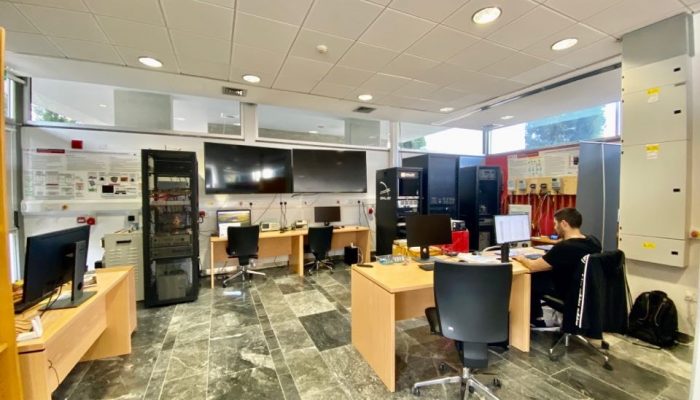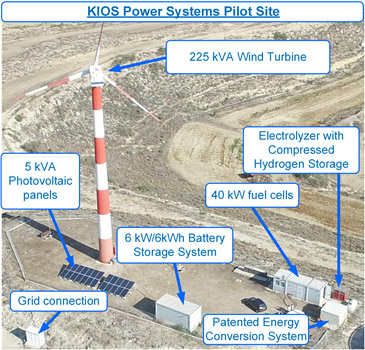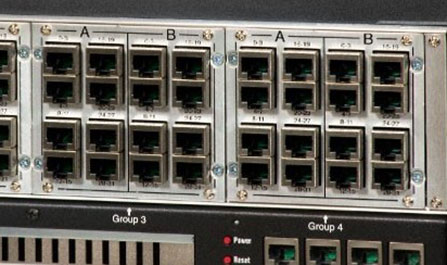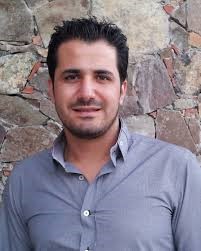Power Systems Research Infrastructure

The Power Systems
The Power Systems Research Infrastructure targets high penetration of renewable energy sources to reduce greenhouse gas emissions. It aims towards modeling, simulation, emulation, and experimental validation of energy systems, with capabilities in the development of smart technology for the efficient and reliable integration of renewable resources both at the building and grid level. A real-time simulator is used to develop digital twins of actual power systems (i.e., the entire Cyprus power system) and investigate the interaction with smart grid controllers and actual power devices in hardware in the loop framework. Three different energy storage pilots and a wide deployment of sychrophasor measurement units in Cyprus power substations are integrated to facilitate the development of intelligent monitoring and control solutions for smart grids. Further capabilities include the development of real- time control algorithms for power electronic converters to advance the grid integration of renewable energy sources as well as testing of cyber security solutions in active distribution grids and in digital substations.
Architecture
The key setups of the KIOS CoE Power System Research Infrastructure are summarized below:
Real-time simulator and hardware in the loop (HIL) framework:
- The Real-Time Simulator is a core component of the Power Systems Research Infrastructure, allowing the development of digital twins of power systems based on accurate modeling and considering field measurements.
- It can be used to perform control-HIL studies and power-HIL investigations by considering the interaction between physical devices and digital twins.
- The real time simulator allows utilities, manufacturers, operators and research institutions to test multiple hardware devices and software solutions in a closed loop adjusting grid and network parameters, contingency scenarios, and device settings in a safe environment.
Fully programmable grid-connected inverter for photovoltaic-battery systems:
- A prototype three-phase grid-connected power electronics inverter (5kVA, 400V) can be used to enable the grid-friendly integration of photovoltaic and storage system.
- A high DC power supply is used as photovoltaic or battery emulator to create the primary source of energy.
- The inverter controller is fully programmable through a dSPACE control platform and setup can be used to test and demonstrate new functionalities and robust control and coordination schemes in renewable energy sources applications.
Energy storage applications:
- Three main setups are available to examine and demonstrate novel functionalities enabled by energy storage systems. A flywheel-based energy storage system (6kWh, 10kW) is used to ensure grid friendly integration of photovoltaics and peak shaving applications in distribution grids.
- Two lithium ion battery storage systems (15kW – 15kWh and 5kW – 10 kWh) are used to demonstrate novel functionalities in different applications: grid-level storage (frequency reserve, peak-shaving, community battery, etc.), storage associate with renewable energy (track the day ahead prediction, compensate the uncertainties, ramp limiting, etc.) and building-level applications (intelligent self-consumption mode, voltage support, etc.).
- The innovative functionalities are integrated with all the prior-mentioned energy storage system through a cloud-based solution developed by KIOS CoE.
Power Systems Pilot Site
The Power Systems Pilot Site covers an outdoor area of 1000 m2 that allows field investigations of new technologies in the area of smart grids.
The pilot site includes: 225 kW wind turbine, 5 kW photovoltaic system, 6 kW/6kWh battery storage system, 40 kW fuel cells, 80 kW electrolyzer, hydrogen storage and patented energy conversion systems.

Capabilities

Hardware-in-the-Loop (HIL) tests:
- Power HIL testing to investigate the interaction between the digital twin of a power system with physical plants (i.e., prototype or commercial inverters of Photovoltaic (PV) and Battery Storage Systems (BSS), laboratory-scale smart distribution grids, Intelligent Electronic Devices (IED) such as: protection relays, smart meters, Phasor Measurement Units (PMUs), etc.)
- Control HIL testing to validate and demonstrate intelligent monitoring and control schemes for smart grids

Security and Safety:
- Validate simulation models’ accuracy considering field measurements
- Test innovative monitoring and control tools under realistic conditions and evaluate their performance on smart grids
- Validate the operation of power equipment according to grid regulations under extreme scenarios
- Test automated control methods for active distribution grids and microgrids using smart meters data and utilizing smart inverters
- Test control methods for power electronics converters in closed loop with prototype or emulated converters

Validation tests in different applications:
- Validate simulation models’ accuracy considering field measurements
- Test innovative monitoring and control tools under realistic conditions and evaluate their performance on smart grids
- Validate the operation of power equipment according to grid regulations under extreme scenarios
- Test automated control methods for active distribution grids and microgrids using smart meters data and utilizing smart inverters
- Test control methods for power electronics converters in closed loop with prototype or emulated converters

Advanced modelling, simulations, monitoring and control schemes:
- Create digital twin design of power systems through the development of accurate real-time simulations considering field measurements
- Analyze the stability and quality of power systems under extreme scenarios
- Create realistic datasets for the power system operation under normal and abnormal conditions
- Design and develop intelligent monitoring and control schemes for smart grids
- Develop advanced inverter controller to advance the robustness and enable multi-functional capabilities for photovoltaic and battery systems
CONTACT US

Dr. Lenos Hadjidemetriou
Power Systems Research Infrastructure Leader |
Research Lecturer
For collaborations or request for the use of the infrastructure please send us an email.


